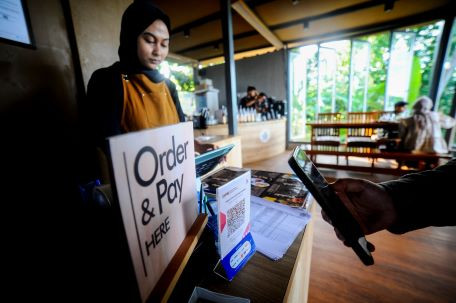News
Taking the Leap in A New Era of Payments
Tushar Agarwal and Carsten Schmidt-Jochmann (The Jakarta Post) September 27, 2024 A customer scans a Quick Response Indonesia Standard (QRIS) code on July 7, 2024 to settle a transaction at Imah Kopi coffee shop in Gunung Karang, Pandeglang regency, Banten. (Antara/Muhammad Bagus Khoirunas)
A customer scans a Quick Response Indonesia Standard (QRIS) code on July 7, 2024 to settle a transaction at Imah Kopi coffee shop in Gunung Karang, Pandeglang regency, Banten. (Antara/Muhammad Bagus Khoirunas)
The rise of digital transactions, cashless payments, alternative payment methods (APMs), and other diruptive technologies are reshaping the payments landscape across the globe. Indonesia is no exception.
A transactional journey that began with the barter system has now evolved into a world of advanced digital payments. Today, digital innovations such as e-wallets, cryptocurrency, and central bank digital currencies (CBDCs) represent a seismic shift for financial institutions (FIs), merchants and economies around the globe.
For FIs, this change is driving remarkable growth opportunities. According to the Boston Consulting Group’s global payment report, global payments revenue is expected to grow by US$2.2 trillion by 2027, with a compound annual growth rate (CAGR) of 5.8 percent for card payments and 15.5 percent CAGR for APMs. Asian markets are a major driver for growth in this new reality.
The Asia Pacific (APAC) region remains a leader in global payment revenues, with the market value expected to hit $748 billion by 2027. Indonesia’s commitment to modernizing its payments infrastructure will play a critical role in maintaining this growth.
Indonesia is primed to be a compelling example of these shifting banking dynamics. The transaction banking (TB) market is expected to grow at a 9 percent CAGR by 2028, reaching $15.2 billion. The commercial and small and medium enterprise (SME) segments will drive this growth, particularly in cash management services where corporations supply liquidity, but SMEs generate higher revenue.
Trade markets are also evolving. Open accounts and supply chain finance are predicted to grow at a CAGR of 10 percent until 2028, with SMEs and commercial clients leading the charge. FIs that hold a large proportion of loans in sectors like manufacturing, consumer goods, mining and agriculture are well positioned to capitalize on these opportunities.
Indonesia is well on its way to achieving the goals outlined in the 2025 Payment Systems (IPS) blueprint by shifting from cash to non-cash payments. BI-FAST has seen year-on-year (yoy) transaction growth of 177 percent, with 4.2 trillion transactions from June 2022 to June 2024.
QRIS, the QR-based payment standard, now offers domestic and international interoperability, and has accumulated over 50 million users and 33 million merchants to date. QRIS usage has grown over 160 percent annually, further accelerating Indonesia’s shift away from cash. SNAP processed 6.3 million transactions with a value of $199 million as of June 2024.
Merchants, for example, should rethink traditional business models as these new payment methods have become the norm. This change of payment mix is expected to benefit merchants and corporations primarily, with 15 to 25 percent uplift in conversion rates, 25 to 50 percent cost-of-risk savings and 10 to 30 percent reduction in back-office costs
Non-card payment options have already proven their viability, including cross-border QR payments. Approximately 80 countries worldwide have implemented real-time payments (RTP), and 12 members of the Asian Payment Network (APN) have signed on for cross-border RTP linkages. Association of Southeast Asian Nations (ASEAN) countries like Indonesia, Singapore, Thailand and Malaysia are at the forefront of this initiative, driving seamless, QR cross-border transactions across the region.
India’s Unified Payments Interface (UPI) serves as a prime example of how payment systems can evolve, advancing from beyond basic transactions to offer financial solutions such as gift cards, pre-approved loans and insurance. With its enhanced app integrations, UPI can support the entire customer journey. International partnerships are also expanding UPI’s global reach with projections of 1 billion daily transactions by 2026.
Across the globe, digital currencies are now moving from concept to reality, with 90 percent of central banks actively engaged in developing or exploring CBDCs. To date, over 30 countries are running pilots at various stages of maturity.
Indonesia Payment Systems (IPS) Blueprint 2030 will be an important national foundation for the country’s own future financial success. This framework focuses on modernization, integration, innovation, international cooperation and the implementation of a Digital Rupiah, which will further facilitate cross-border payments and trade finance growth.
This is good news for Indonesia, with the country’s trade balance surplus projected to grow in the medium term — despite slowdowns in more developed countries. The intra-ASEAN and ASEAN-China trade corridors are expected to experience high growth, resulting in a surge of cross-border payments.
Looking toward the future, corporations should anticipate an increase in embedded finance and connected commerce across all sectors. Embedded finance has a projected global market size of more than $320 billion by 2030, led by payments, lending and insurance. The rise of multi-rail players is also revolutionizing the distribution of payment solutions, with independent software vendors (ISVs) emerging as a significant channel.
As competition intensifies, partnerships between traditional banks and fintech firms have become crucial for future success as the "champions of tomorrow”. For instance, HSBC partnered with Finastra to offer cost-effective banking-as-a-service (BaaS) foreign exchange solutions to regional mid-tier banks. Large banks such as Mandiri, BCA and BRI have strategic partnerships with multiple fintechs to expand payments and financial ecosystems.
We will also see SMEs emerge as a new source of value in the wholesale space. As FIs digitize their operations and promote cashless transactions, payment volume growth is no longer restricted to large corporations — creating more opportunities for SMEs to grow their businesses. Banks like Mandiri and BRI have already launched platforms such as Kopra Lite Cash, Qlola and Pasar.ID as part of their efforts to build digital ecosystems that empower SMEs and traditional merchants.

